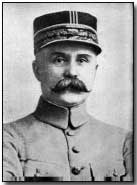Who's Who - Henri-Philippe Petain
 Henri-Philippe Petain
(1856-1951) was a cautious but successful French army commander. At
the start of the war Petain was respected as a theoretician who argued
against the then-prevailing doctrine of 'offensive spirit', believing that
modern weaponry favoured defence more than offence.
Henri-Philippe Petain
(1856-1951) was a cautious but successful French army commander. At
the start of the war Petain was respected as a theoretician who argued
against the then-prevailing doctrine of 'offensive spirit', believing that
modern weaponry favoured defence more than offence.
These views somewhat hindered his advance through the army (Foch, for example, believed the opposite to be the case), and he was still a regimental colonel with the Fifth Army at the start of the war and due for retirement. However he thereafter enjoyed rapid promotion: to divisional command during the First Battle of the Marne, and to corps command by October. From July 1915 he led the Second Army, holding the front south of Verdun.
Germany's initial successes at Verdun led Joffre, the Commander-in-Chief, to appoint Petain in direct command of the defence of Verdun on 26 February 1916. Ordered to hold the sector at all costs, Petain delivered upon his famous pledge "Ils ne passeront pas!" ('They shall not pass!'), earning acclaim for his policy of artillery-based defence backed by expert organisation of supplies and manpower.
Petain was promoted in 1916 to command of Army Group Centre, which covered the Verdun sector. He recommended withdrawal from the French position, but was over-ruled by Joffre. Petain's successor in direct command of the defence, Robert Nivelle, took much of the credit for the successful French counterattacks that regained much of the lost ground later that year, and was promoted beyond Petain to replace Joffre in December 1916.
Nivelle's policy of attack at all costs was discredited as a consequence of the failure of the Nivelle Offensive in spring 1917. With mutiny spreading throughout the French army' front-line units, Petain was appointed Commander-in-Chief on 15 May 1917.
Petain restored the fighting capacity of the French forces by improving living conditions for soldiers at the front, and by restricting himself to defensive operations. However his notions of tactical defence were alien to many of his commanders, and was a major factor in the collapse of French positions during the Aisne offensive of May 1918.
As a consequence of Aisne Petain was subordinated to Allied Supreme Commander Ferdinand Foch and played a relatively minor role in the remainder of the war.
One week after the armistice, on 19 November 1918, Petain was promoted to Field Marshal, remaining active in military affairs, travelling to Morocco where he brought the joint French/Spanish campaign against Abd el-Krim to a successful conclusion. He also served briefly as war minister in 1934. He became ambassador to Spain in 1939-40.
In 1940, at the age of 83, he headed the Vichy government of France during the Second World War, from 11 July 1940 until 20 August 1944. Petain established a Fascist-oriented government that became notorious for its collaboration with the Third Reich. Ruling with German approval, Petain's government passed anti-Semitic laws, rounding up French, Spanish and Eastern European Jews for deportation to German concentration camps.
For his collaboration he was sentenced to death for treason following the war, on 15 August 1944, a sentence that was commuted to life imprisonment by Charles de Gaulle, who had served as a junior officer in Petain's regiment at Charleron in August 1914.
Henri-Philippe Petain died on 23 July 1951.
A "chit" was British slang for a piece of paper.
- Did you know?
